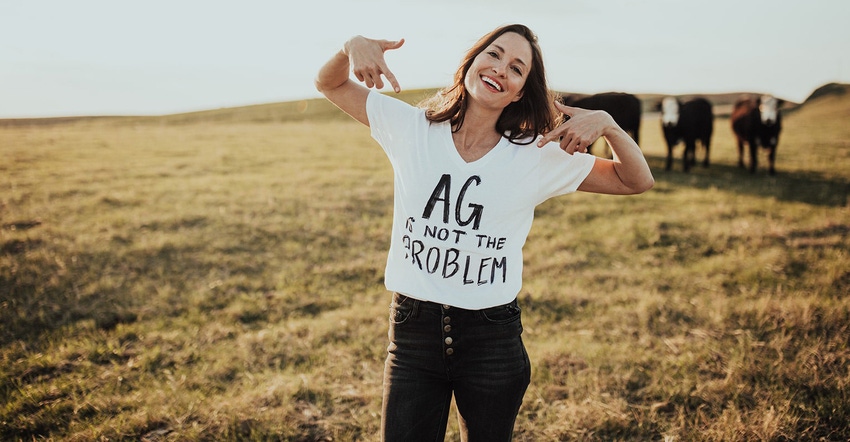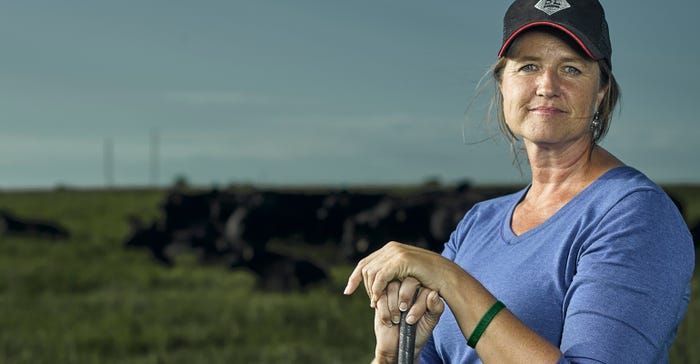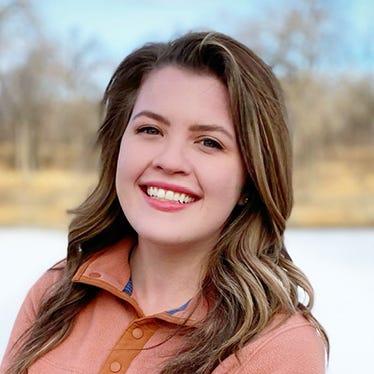
“Ag is not the problem.”
The message, handwritten with a black Sharpie on a white T-shirt, captured attention on Instagram. It was Natalie Kovarik’s response to a negative post about the beef industry.
“I remember sitting around the table with my husband and just saying that what if we could get it across to people that ag isn’t the problem, and we’re actively trying new things and addressing issues we face,” Kovarik recalls.
So, she grabbed a marker and wrote a slogan. The response from her social media audience was overwhelming, as members clamored for their own shirt as a symbol of solidarity.
Greenhouse gas emissions, water and land use — these are always attacks on agriculture and the beef industry when it comes to sustainability. A fourth-generation Nebraskan rancher, Kovarik is one advocate who is challenging the conversation.
With nearly 70,000 followers on Instagram, she works to inform her audience about ranching practices and the beef industry with witty and educational posts to engage and enlighten both consumers and fellow farmers and ranchers.
Here is one example from a post: “Agriculture has the unique ability to help solve some of our most challenging environmental problems. From up-cycling inedible material into high-quality protein to improving soil health, increasing biodiversity and recycling water — livestock play a critical role in maintaining a healthy ecosystem and feeding a hungry nation. Climate issues are important, and we all want to do something to help, but using ag as a scapegoat is not going to solve any problems. If you’d give ag a chance, though, we could actually help solve some.”
Kovarik says “ag is part of the solution” to consumer climate and sustainability concerns. Getting the message across starts with beef producers engaging in discussions, she says, whether on social media or in corporate boardrooms.
Engaging off the farm
For Kovarik, it is a simple post from her farm kitchen table. For Kansas cattle producer Debbie Lyons-Blythe, it is a drive to Colorado to attend the U.S. Roundtable for Sustainable Beef.
The vision for this multistakeholder group is to create a U.S. beef value chain that is the trusted global leader for environmentally sound, socially responsible and economically viable beef production.
 CLIMATE CHANGER: Debbie Lyons-Blythe uses a grazing plan on her family’s farm near White City, Kan., as a way to save the soil and provide nutrients back to the land. As a founding member of the U.S. Roundtable for Sustainable Beef, she knows the importance of cattle producers being a key voice in the climate change conversation.
CLIMATE CHANGER: Debbie Lyons-Blythe uses a grazing plan on her family’s farm near White City, Kan., as a way to save the soil and provide nutrients back to the land. As a founding member of the U.S. Roundtable for Sustainable Beef, she knows the importance of cattle producers being a key voice in the climate change conversation.

“As a family ranch, we decided this was a big issue and something we needed to get involved in,” Lyons-Blythe explains. “If we want to show that farmers and ranchers are doing a great job, then we have to be involved in the conversation.”
So, the family ranch became a founding member of the roundtable in 2015, and Lyons-Blythe soon will take over as chair.
Lyons-Blythe, who with her husband Duane Blythe, operates Blythe Family Farms in White City, Kan., represents beef operations across the U.S. on the roundtable, by answering questions about how sustainability and climate rules or practices impact farms. For her, the conversation extends well beyond the farm gate and into the food chain.
As part of the roundtable, she interacts with both governmental and nongovernmental organizations, academia, feedlots, beef processors, and food retailers. The roundtable does not accept everyone, she explains, adding that individuals and companies must commit to being a “positive influence, a positive driver for beef sustainability in America.”
“There are so many companies getting involved in the sustainability and climate space, that farmers and ranchers need a seat at the table during these discussions,” Lyons-Blythe says.
Driver behind dialogues
In 2020, retailers like Walmart and Sam’s Club announced plans to source fresh beef products more sustainably by 2025, focusing on grazing management and soil health across 12 million acres.
McDonald’s also joined the movement by looking at climate solution opportunities throughout its beef and chicken supply chains. The company is now building programs with suppliers to meet its 31% greenhouse gas reduction goal.
Lyons-Blythe says these types of recent changes came after a period of negativity toward the beef farmer’s role in climate issues, which began 15 years ago.
At that time, the Food and Agriculture Organization of the United Nations released the report “Livestock’s Long Shadow: Environmental Issues and Benefits,” which called out methane gas production by the cattle industry as a cause for greenhouse gas and recommended a reduction in meat consumption.
“That was the beginning of the real push for Meatless Monday,” Lyons-Blythe says.
In rejecting the report, she says, “It's been very clearly indicated that the study was done poorly, and compared animal agriculture and transportation not at all the same. If they want to make a true comparison, then livestock emissions are way lower. It’s been proven, but it's not what the public hears. The public still has in mind that cows are to blame.”
Beef rancher perspective
In the U.S., cattle are grazed on 775 million acres of grasslands, rangelands and pastures. Corn used for feed is grown on 30 million acres of farmland. Combined, the beef industry touches more than 40% of the nation’s land.
“When I think about sustainable agriculture, in its simplest form is giving back to the land as much as you take away from it,” Kovarik says.
She and her husband, Luke, run a registered Angus operation that focuses on commercial cow-calf profitability through quality replacement heifers and maternal genetics.
The Kovariks make decisions that can give back to the ranch so it’s there for the next generation — their three children, Tad, Jaks and Rue. They incorporate farm management practices such as adopting rotational grazing, using cover crops, working with their local Natural Resources Conservation Service and planting tree shelter rows.
“We’re big believers in cover crop planting,” Kovarik explains. “We also are working to sync our herd with more natural features and have moved our calving date. That helps to cut down on feeding and allow the cattle to be more in sync with nature.”
For Blythe Family Farms, changing the climate conversation comes down to the preservation and improvement of land.
“The biggest impact we can make on America’s farms and ranches is to have a grazing management plan,” Lyons-Blythe explains. “Simply by having a grazing management plan, you are impacting three of [U.S. Roundtable for Sustainable Beef] key indicators — land, water and greenhouse gas emissions.”
Understanding the importance of soil health for the environment and their cattle operations, most beef producers have a grazing plan. However, Lyons-Blythe says the plan shouldn’t remain in their head but be put in writing to make it sustainable for future generations.
Lyons-Blythe, husband and children run the ranch. Still, she says the next generation doesn’t recall, or hadn’t been born yet to experience every drought year and how the family grazed the following year to facilitate recovery. “Document good rainfall and years without,” she adds. “Keep it and develop a grazing plan for the future.”
Next, Lyons-Blythe encourages beef producers to share stories of how they farm — whether to others at the local coffee shop or on social media.
Sustainability meant to spread
Kovarik first started on social media when posting about a direct beef marketing partnership with a friend. That’s where she saw the power of sharing her story online and developed a passion for it.
“I never set out to start out thinking I’d be doing what I am now. It just kind of developed along the way,” she says. “I really wanted to be able to share our personal story and do a little bit more advocacy. I want to create a community that trusts and believes in agriculture as much as I do.”
Kovarik took input and support from her community to launch the brand “Ag is not the problem” and its sister brand “Ag is part of the solution.” She plans to give some of the proceeds back to the agriculture industry to continue dispelling negativity surrounding beef production.
Just one post helped build two brands that further the positive messaging of agriculture and beef production in the climate conversation.
To find more information about Kovarik’s ranch and advocacy work, check out her website, kovarikcattleco.com. To find out how your farm can become part of the U.S. Roundtable of Sustainable Beef, visit usrsb.org.
About the Author(s)
You May Also Like






